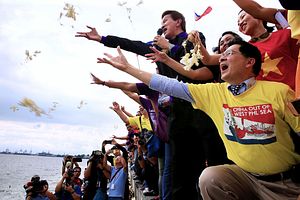In April 2012, around a then-relatively unknown shoal off the coast of the Philippines’ largest island of Luzon, the Philippine Navy apprehended several Chinese fishing vessels. Though it was not known at the time, this incident at Scarborough Shoal would simmer into a major stand-off between the Philippines and China over the ensuing months, eventually sparking the contemporary period of tension and geopolitical intrigue in the South China Sea.
In a moment of bold realpolitik, after both countries agreed to stand down from the shoal, Chinese maritime law enforcement vessels seized the feature. In the aftermath of the 2012 stand-off, Philippine fishermen were unable to fish freely at Scarborough Shoal. Left with no other recourse, the Philippine government, then led by President Benigno Aquino III, initiated an international arbitration under the compulsory dispute mechanism of the United Nations Convention on the Law of the Sea (UNCLOS), seeking not only to clarify the ambiguities that led to the Scarborough Shoal stand-off in 2012, but Chinese maritime claims in the South China Sea more broadly.
That arbitration, which China refused to participate in, has lingered over the South China Sea in the three-and-half years since. Amid continuing Chinese assertiveness in the region, including island-building in the Spratly group and continued militarization of its Paracel possessions, the resolution of the case loomed large.
At long last, on July 12, 2016, the arbitral tribunal hearing the case of the Philippines v. China released its unanimous findings after three years of deliberation. These findings comprehensively supported nearly all of the 15 claims made by the Philippines and represented a major advancement in interpreting, clarifying, and applying UNCLOS.

































